The Supreme Court's liberal bloc issued blistering dissents Monday in the Trump immunity ruling, arguing that it "reshapes the institution of the presidency" and "makes a mockery" of the constitutional principle that no man is above the law.
Justice Sonia Sotomayor, reading her dissent from the bench, said that "relying on little more than its own misguided wisdom ... the Court gives former President Trump all the immunity he asked for and more."
She added that "because our Constitution does not shield a former President from answering for criminal and treasonous acts, I dissent."
The Supreme Court ruled 6-3 on ideological lines that former President Donald Trump has immunity for some of his conduct as president but not unofficial acts in the federal election interference case. The court did not determine what constitutes an "official" act in this case, leaving that to the lower court.
Get Southern California news, weather forecasts and entertainment stories to your inbox. Sign up for NBC LA newsletters.
The decision adds another hurdle and further delay to special counsel Jack Smith's prosecution of the former president. Trump was indicted last year on charges he conspired to "overturn the legitimate results of the 2020 presidential election."
Sotomayor said that the majority opinion, written by Chief Justice John Roberts, invents "an atextual, ahistorical, and unjustifiable immunity that puts the President above the law."
Their ruling, she went on, makes three moves that she said "completely insulate Presidents from criminal liability." Sotomayor said the court creates absolute immunity for the president's exercise of "core constitutional powers," creates "expansive immunity for all 'official acts,'" and "declares that evidence concerning acts for which the President is immune can play no role in any criminal prosecution against him."
U.S. & World
News from around the country and around the globe
Sotomayor warned that the ruling "will have disastrous consequences for the Presidency and for our democracy" and that it sends the message: “Let the President violate the law, let him exploit the trappings of his office for personal gain, let him use his official power for evil ends.”
She added, “Even if these nightmare scenarios never play out, and I pray they never do, the damage has been done. The relationship between the President and the people he serves has shifted irrevocably. In every use of official power, the President is now a king above the law.”
Justice Amy Coney Barrett wrote in a concurring opinion that she agreed with some of the majority opinion but not all of it. Notably, she said she agreed with the dissenters that Trump’s immune conduct should still be allowed to be used as evidence in his trial.
“The Constitution does not require blinding juries to the circumstances surrounding conduct for which Presidents can be held liable,” she said.
In her own written dissent, Justice Ketanji Brown Jackson said that the majority's ruling "breaks new and dangerous ground."
"Departing from the traditional model of individual accountability, the majority has concocted something entirely different: a Presidential accountability model that creates immunity—an exemption from criminal law — applicable only to the most powerful official in our Government," she wrote.
Jackson warned that under the majority's "new Presidential accountability mode," a hypothetical president "who admits to having ordered the assassinations of his political rivals or critics...or one who indisputably instigates an unsuccessful coup...has a fair shot at getting immunity."
The chief justice dismissed the dissents, suggesting that his three liberal colleagues had misinterpreted the majority's opinion and were engaging in "fear mongering." Roberts argued that they "strike a tone of chilling doom that is wholly disproportionate to what the Court actually does today." He wrote that "like everyone else, the President is subject to prosecution in his unofficial capacity."
He also appeared to scoff at Sotomayor for what she included in her dissent, saying that her "most compelling piece of evidence consists of excerpted statements of Charles Pinckney from an 1800 Senate debate." He continued, "But those statements reflect only the now-discredited argument that any immunity not expressly mentioned in the Constitution must not exist."
Justice Amy Coney Barrett wrote in a concurring opinion that she agreed with some of the majority opinion but not all of it. Notably, she said she agreed with Sotomayor that Trump’s immune conduct should still be allowed to be used as evidence in his trial.
“The Constitution does not require blinding juries to the circumstances surrounding conduct for which Presidents can be held liable,” she said.
Soon after the court issued the ruling, Trump celebrated the decision on his Truth Social account, writing in all caps: "Big win for our Constitution and democracy. Proud to be an American!"
A Biden campaign adviser, on the other hand, said that the ruling doesn't change what happened on Jan. 6, 2021.
"Donald Trump snapped after he lost the 2020 election and encouraged a mob to overthrow the results of a free and fair election," the adviser said. "Trump is already running for president as a convicted felon for the very same reason he sat idly by while the mob violently attacked the Capitol: he thinks he’s above the law and is willing to do anything to gain and hold onto power for himself."
This article first appeared on NBCNews.com. More from NBC News:



